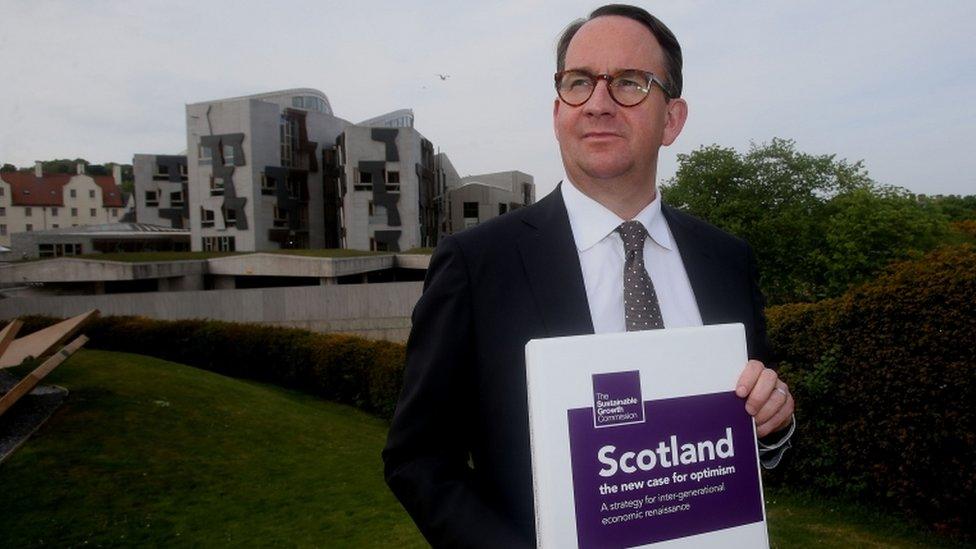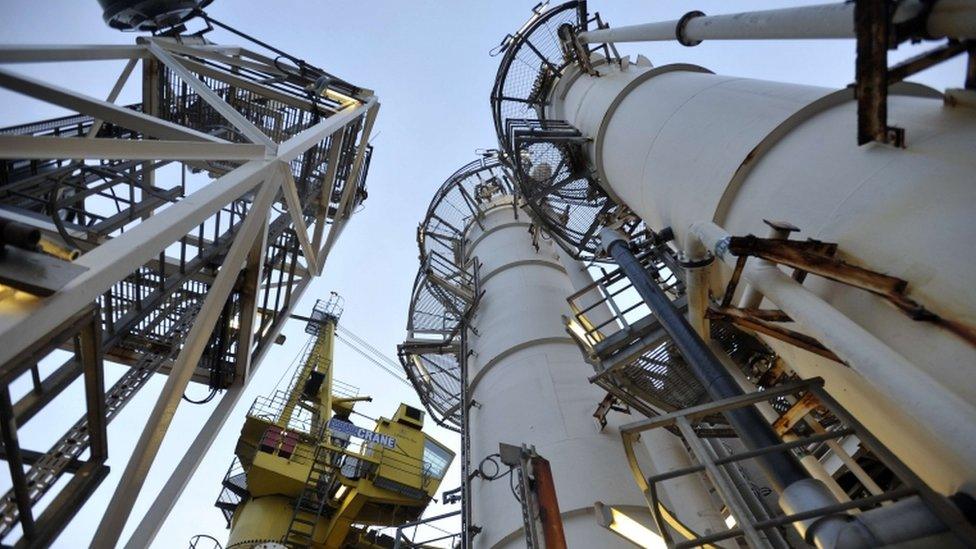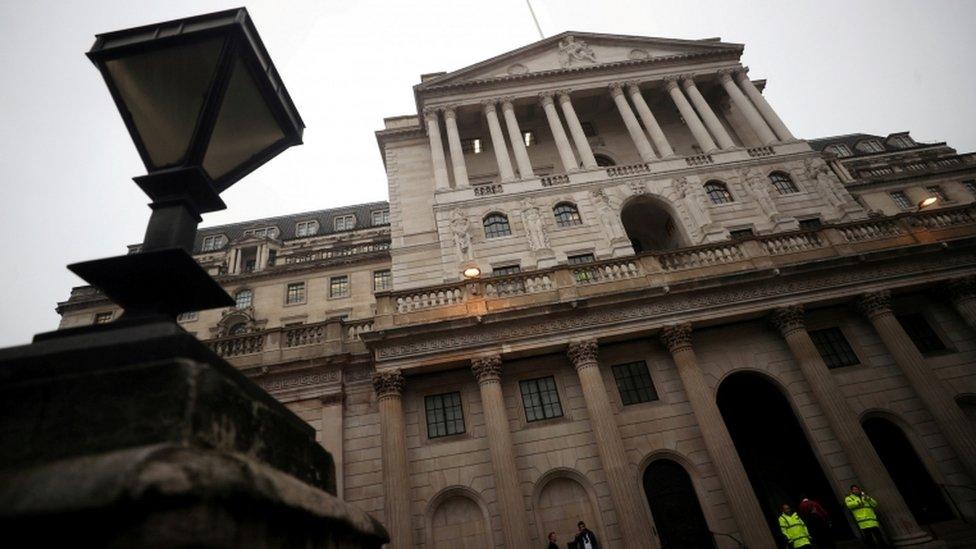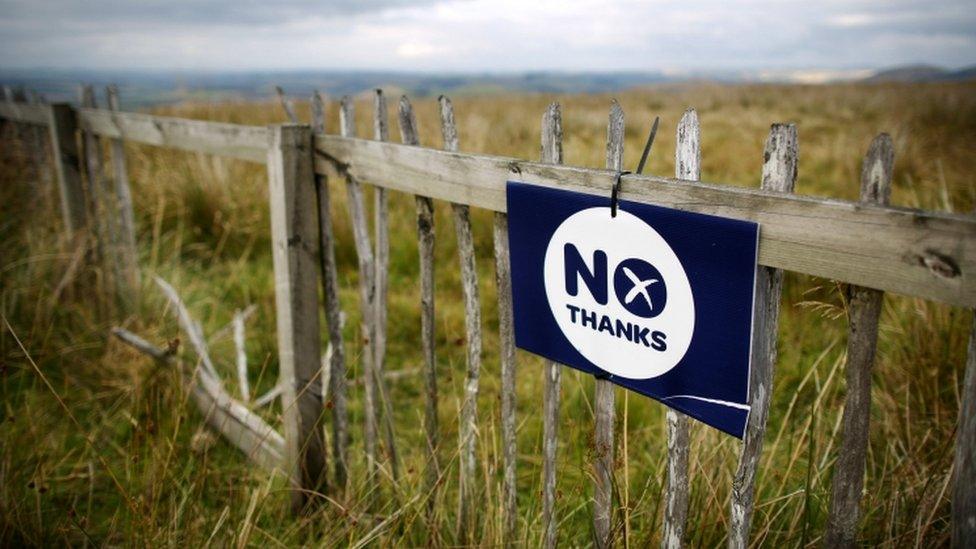Rebooting the case for Scottish independence
- Published

Four years on from That Referendum on Scotland, and what's changed? Well, quite a lot, thanks to Brexit, three national elections, a new first minister, a new prime minister, the rise of Richard Leonard and Rees-Moggery, plus an oil and gas slump.
But the polling figures on independence have barely shifted.
"Why?" I was asked this week by a semi-detached Nationalist.
"Because the arguments haven't moved," he answered himself.
Neither side has reflected, in public at least, on where their arguments needed sharpening up, least of all on the economic questions.
Until today - 25 May 2018. Remember the date. It just might turn out to be significant.
A big dollop of candour
The Sustainable Growth Commission will take some digesting. It's a weighty, meaty document.
From what I've been told about its recommendations, it retains much of the sunny optimism that buoyed the Yes campaign in 2014, but to that has been added a big dollop of candour.
As an economic prospectus for independence, it recognises that people were not sufficiently reassured in 2014, least of all about their pensions, savings and mortgages.

They heard glib assurances back then that negotiations with Westminster would go swimmingly, because that would be in Westminster's interest. Downing Street would give Scotland what was asked for, including joint control of sterling.
Transition costs were so low as to lack any serious costing. And a higher economic growth rate would flow from an enlightened administration taking all the right policy and fiscal decisions, without facing economic or political headwinds or any internal contradictions on lowered tax and higher spending.
I recall one Yes supporter wryly comparing the sentiment of the movement back then to the Summer of Love in 1967. Everything good was possible, and all at once. Nothing bad need happen. It was groovy, man.
Positivity and optimism
Andrew Wilson is no hippie, though he draws deeply on the pipe of positivity and optimism.
The commission he has led has applied candour to each of the weaker points in the 2014 economic prospectus, and conceded some ground to the critics of independence, in the interests of credibility.
Take the currency for instance. The new plan does not seek shared control of the Bank of England.
It takes the word of the former governor, Lord (Mervyn) King, that Scotland could certainly be independent, and it could use sterling, but at one big cost: Holyrood would have to accept whatever monetary decisions are made in the City of London, and made in the interests of a London-dominated nation that no longer included Scotland.

If Scotland's economy were out of sync with the cycle in the UK, that could be painful. That's how it was in the 1990s, and Alex Salmond railed against it.
But in recent years, London has been the outlier, and Scotland has been at or near the UK average. So interest rate and financial policies set for the British middle ground, even without Scotland in Britain, might have suited Holyrood just fine.
A central bank would be set up, without control over interest rates, and there would be a regulator, but with a light workload, as the banks would have shifted at least their brass plates south of the Border, to be regulated from London.
Any smaller financial institutions, still based in Scotland, would have low expectations of a bail-out - though since the crash, that's now the message to all lenders.
What about fiscal policy?
Or take fiscal policy. The Wilson Commission gulps in full the harsh message from GERS - Government Expenditure and Revenue Scotland.
A deficit, including oil and gas revenue, at nearly 10% of national output, or Gross Domestic Product, is not sustainable, it is conceded.

So what to do?
A lot of work has gone into the answer. It is not simply to grow the economy faster, as the name of the commission suggested it should. The days of the tiger economies, at least in Europe, have gone.
The best hope for boosting growth in the short term - productivity being a longer-term project - is seen as a boost to immigration, with a "Come to Scotland" campaign, and financial incentives thrown in.
That's easy for an economist to say: less so for a politician (I intend to return to the question of growth once I've had a chance to digest the recommendations).
Discipline on spending
A key element of the Wilson answer to the fiscal question is discipline on spending. This looks like, politically, the most difficult factor to manage, in an excited environment where expectations can run away from reality.
The constraint would not be a real terms cut, but instead a very small increase, at 1% below the cash terms increase in economic growth.
For example, suppose 2% inflation and 1.5% real growth, which is not an unreasonable target, meaning 3.5% cash growth. Pare that back to a disciplined 2.5% increase in public spending, and you could guess that would make for uncomfortable discussions round the Cabinet table.

Pressure is expected to build on health and social care budgets
The aim, remember, is to be doing this over the years when immense pressure is expected to build on health and social care budgets.
The Wilson report adds to that a cut in defence, including the nuclear deterrent budget, to 1.6% of national economic output (To be clear: Trident money would not be spent on other priorities. It would be put into deficit reduction). Then review tax collection and get it to the same level of efficiency as the best of smallish nations.
There's a call for a rigorous review of all spending, to ensure that the government doesn't keep spending on the priorities of 10 or 20 years ago, just because it's aye been, and because those programmes are too difficult to cut.
And oil and gas? No, that is taken out the equation, to be treated as a windfall, and put into a future generations fund for long-term projects.
All this assumes a taxing and spending regime which doesn't depart much from what we have at the moment.
In the early years, it does not encourage people to think that Scotland would shift either to a high-tax, high welfare Scandinavian model or low tax and low regulation. Nor does it battle through the thicket of possibilities around Brexit, and where Scotland might find itself over the next few years.
Running a deficit
For five to 10 years of such a fiscal plan, it is reckoned that an independent Scotland would be running a deficit and building up debt. Modelling with what they say are conservative assumptions, the deficit would fall to 3% in the ninth year.
That's the level widely seen, as in euro currency rules, to be a safe and stable level of deficit.
Only then could the government start to look at the five other tests being set for creating a Scottish currency - a small package of tick boxes designed to reassure voters and the markets with a canny nod to caution.

So while leaving monetary policy to the Bank of England, and requiring tight discipline on spending, the rhetoric of independence or even "taking back control" begins to lose its shine.
Critics of independence might well question if it would be worth all the effort, and £450m in estimated transition costs, only to find that a change in constitutional status hasn't moved the dials much.
A lot of inter-dependence
But that's one of the many lessons we're in the early stages of learning from the Brexit process. "Taking Back Control" in an open, modern economy is something of a mirage.
Even a sovereign parliament is constrained by international agreements and market orthodoxies.
And even at Whitehall's scale and depth, the capacity of government to negotiate and and to manage upheaval is itself a major constraint.

In turn, that places tight limitations on what else it can be expected to achieve in managing or reforming public services.
Unpicking economic unions, whether 45 years in the making in Europe or 311 years in Britain, is much more complicated than it might look at first. Bigger and established players in negotiations tend to have most leverage.
When it's done, independence has to be combined with some dependence and a lot of inter-dependence, requiring compromise. And as the Swiss sometimes observe about their relations with Brussels, the negotiations never stop.
Moving the dial
In that sense, though in few others, the Brexit negotiations may be doing the Scottish constitutional debate a favour. Looking at London and Brussels, Scots can see and smell the rubber hitting the road.
Voters may be more likely, therefore, to seek and reward candour, rather than jumping on the bandwagon painted in the brightest red and sporting the most populist slogan.
That's among the big challenges thrown down by the Wilson Commission. The report gives the independence movement something big and meaty to chew on, and to debate internally, perhaps then to move the dials in its direction on the Yes and No polling.
It throws down the gauntlet to opponents of Scottish independence to reflect at least as seriously on the campaign they ran in 2014.

They got the majority. But at least some must surely be wary of complacency.
Would the same campaign and arguments work again, in the wake of Brexit, and against the Andrew Wilson prospectus?
And the report is also a challenge to all of us who take some part in the debate about Scotland's future.
From what we know about it so far, the report of the Sustainable Growth Commission sounds like a serious document for serious times.
It is a more mature approach than we've seen for a long time, and surely demands a mature response.
- Published3 May 2018

- Published9 February 2018

- Published22 April 2018
